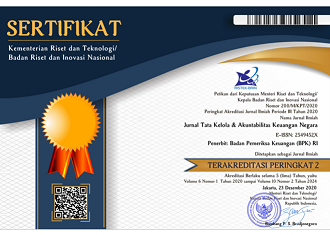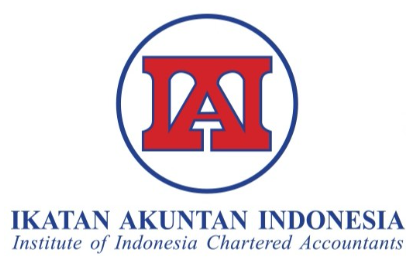Improving incentives for regional tax collectors: Aligning regulations with governance goals
Keywords:
cost-benefit analysis, regional tax, tax-collecting incentiveAbstract
This study explores inefficiencies in existing tax-collection incentive schemes, emphasizing the misalignment between their intended objectives and actual outcomes regarding performance, governance, and workload management. By employing a normative legal approach, it evaluates regulations governing tax collector incentives and assesses their effectiveness in meeting the desired outcomes. Through a cost-benefit analysis (CBA), the research proposes a more equitable incentive structure that integrates workload and performance-based factors. The findings indicate that result-based incentives often fail to account for the complexity of tax-collection tasks, leading to inefficiencies and undermining fiscal objectives. Moreover, the study demonstrates that workload-sensitive incentives can better align tax collector efforts with goals such as improved revenue generation and better governance. These incentives underscore the government’s commitment to integrity and professionalism in the tax system. The study concludes that tailoring incentives to workload variations fosters fairness and enhances accountability in tax administration. Offering innovative insights, this study proposes a balanced, workload-sensitive incentive scheme—a relatively unexplored approach in regional tax collection—which could serve as regulatory a reference under the new regional tax law.
References
Adiyanta, F. C. S. (2019). Karakteristik responsif peraturan daerah tentang pajak-pajak daerah sebagai representasi dan partisipasi kehendak publik. Administrative Law and Governance Journal, 2(3), 380–399. https://doi.org/10.14710/alj.v2i3.380-399
Akbar, B. (2013). Sistem pengawasan keuangan negara di Indonesia. CV. Bumi Metro Raya
Akbar, H. (2023, Juli 4). BPK ungkap insentif PPJ Rp 777. Juta di Lombok Tengah langgar ketentuan. DetikBali. https://www.detik.com/bali/nusra/d-6806165/bpk-ungkap-insentif-ppj-rp-777-juta-di-lombok-tengah-langgar-ketentuan
Almunanda, F. (2021, June 21). Kepala BPPRD Kota Jambi jadi tersangka dugaan korupsi insentif pajak. Detiknews. https://news.detik.com/berita/d-5614757/kepala-bpprd-kota-jambi-jadi-tersangka-dugaan-korupsi-insentif-pajak
Andriani, F., Nurmayani., & Deviani, E. (2022). Hotel tax imposition on households review of the principles of tax collection (the four maxims Adam Smith). Proceedings of the Universitas Lampung International Conference on Social Sciences (ULICoSS, 2021), 576–578. https://doi.org/10.2991/assehr.k.220102.078
Asshidiqie, J. (2022). Konstitusi ekonomi. Penerbit buku Kompas.
Astomo, P., & Farhanuddin, F. (2018). Politik hukum pajak daerah di Kabupaten Polewali Mandar Sulawesi Barat. Kanun Jurnal Ilmu Hukum, 20(3), 511–524. https://doi.org/10.24815/kanun.v20i3.11175
Bawazier, F. (2011). Reformasi pajak di Indonesia. Jurnal Legislasi Indonesia, 8(1), 1–12. https://doi.org/10.54629/jli.v8i1.344
Besley, T., & McLaren, J. (1993). Taxes and bribery: The role of wage incentives. The Economic Journal, 103(416), 119–141. https://doi.org/10.2307/2234340
Bhirawa, H. (2019, October 22). Pemotongan insentif pajak daerah di BPPKAD, Sekda Gresik ditetapkan sebagai tersangka. BPK RI. https://jatim.bpk.go.id/kasus-aktual/pemotongan-insentif-pajak-daerah-di-bppkad-sekda-gresik-ditetapkan-sebagai-tersangka/
BPK RI. (2015). Audit Report on the Financial Statements of Local Government A. Unpublished document.
BPK RI. (2016). Audit Report on the Financial Statements of Local Government B. Unpublished document.
BPK RI. (2019a). Audit Report on the Financial Statements of Local Government C. Unpublished document.
BPK RI. (2019b). Audit Report on the Financial Statements of Local Government D. Unpublished document.
BPK RI. (2021a). Audit Report on the Performance of Regional Income Management of Local Government F. Unpublished document.
BPK RI. (2021b). Laporan hasil reviu atas kemandirian fiskal pemerintah daerah tahun 2020 (Nomor 26f/LHP/XV/05/2021). https://www.bpk.go.id/assets/files/lkpp/2020/lkpp_2020_1624341245.pdf
BPK RI. (2022). Audit Report on the Financial Statements of Local Government E. Unpublished document.
Burgess, S., Propper, C., Ratto, M., & Tominey, E. (2017). Incentives in the public sector: Evidence from a government agency. The Economic Journal, 127(605), F117–F141. https://doi.org/10.1111/ecoj.12422
Burton, R. M., Obel, B., & Håkonsson, D. D. (2015). Organizational design (3rd ed.). Cambridge University Press. https://doi.org/10.1017/CBO9781316160787
Cahyadini, A., Hutagalung, J. I. G., & Muttaqin, Z. (2023). The urgency of reforming Indonesia’s tax law in the face of economic digitalization. Cogent Social Sciences, 9(2). https://doi.org/10.1080/23311886.2023.2285242
Cochrane, G. (2010). Policies for strengthening local government in developing countries (SWP 582, Washington, D.C.: World Bank Group). http://documents.worldbank.org/curated/en/230821468739192344/Policies-for-strengthening-local-government-in-developing-countries
Devi, R. S., Zulkarnaen, N. J. R., & Pratiwi, R. I. (2021). Tinjauan yuridis terhadap pajak daerah dan retribusi daerah studi pelaksanaan di unit pelayanan pajak daerah Samsat Kota Binjai. Jurnal Rectum, 3(2), 195–211. https://doi.org/10.46930/jurnalrectum.v3i2.1177
duPreez, H. (2018). Constructing the fundamental principles of taxation through triangulation. The ATA Journal of Legal Tax Research, 16(2), 25–45. https://doi.org/10.2308/jltr-52190
Eichfelder, S., & Kegels, C. (2014). Compliance costs caused by agency action? Empirical evidence and implications for tax compliance. Journal of Economic Psychology, 40, 200–219. https://doi.org/10.1016/j.joep.2012.08.012
Fanea-Ivanovici, M., Muşetescu, R. C., Pană, M. C., & Voicu, C. (2019). Fighting corruption and enhancing tax compliance through digitization: Achieving sustainable development in Romania. Sustainability, 11(5), 1–24. https://doi.org/10.3390/su11051480
Haluan. (2018, November 12). Upah pungut 11,4 miliar tuai sorotan. BPK RI. https://sumbar.bpk.go.id//wp-content/uploads/2018/11/2018_KLI_SB_HALU1211.pdf
Iskandar, T. D. (2024, March 1). Kejari Aceh Barat usut dugaan korupsi pajak daerah miliaran rupiah. Antaranews. https://aceh.antaranews.com/berita/355182/kejari-aceh-barat-usut-dugaan-korupsi-pajak-daerah-miliaran-rupiah
Jambi District Court. (2021). The Corruption Court at the Jambi District Court decision No. 23/Pid. Sus-TPK/2021/PN. https://sipp.pn-jambi.go.id/index.php/detil_perkara
Jeddawi, M. F. H. (2021). Alternatif strategi menekan kesenjangan kemandirian fiskal antar daerah di Indonesia. Jurnal Pallangga Praja (JPP), 3(2), 51–57. https://doi.org/10.61076/jpp.v3i2.2065
Johnsen, Å., Solholm, K., & Tufte, P. A. (2024). Performance measurement system design as a link between strategy formulation and performance information use in public sector organizations. Public Performance and Management Review, 47(4), 1–36. https://doi.org/10.1080/15309576.2024.2360158
Juliarini, A. (2020). Komparasi penerimaan pajak daerah kota dan kabupaten di Indonesia setelah berlakunya undang-undang pajak daerah dan retribusi daerah. Jurnal BPPK: Badan Pendidikan dan Pelatihan Keuangan, 13(2), 1–10. https://doi.org/10.48108/jurnalbppk.v13i2.227
KPK. (2024). KPK tetapkan Bupati Sidoarjo tersangka pemotongan uang insentif pegawai. KPK. https://www.kpk.go.id/id/ruang-informasi/berita/kpk-tetapkan-bupati-sidoarjo-tersangka-pemotongan-uang-insentif-pegawai
Nadhor, R. A. (2019). Pengaruh dana perimbangan dan pendapatan asli daerah (PAD) terhadap belanja daerah pemerintah (Studi kasus pada 34 provinsi di Indonesia periode 2017–2018). Jurnal Ilmiah Mahasiswa FEB Universitas Brawijaya, 8(2), 1–38. https://jimfeb.ub.ac.id/index.php/jimfeb/article/download/6746/5841
Nugroho, A. D., & Yuniza, M. E. (2012). Pengaturan pajak daerah di Provinsi Daerah Istimewa Yogyakarta dan Kota Yogyakarta. Mimbar Hukum, 24(1), 130. https://doi.org/10.22146/jmh.16150
OECD. (2020). Regulatory impact assessment, OECD best practice principles for regulatory policy. OECD Publishing. https://doi.org/10.1787/7a9638cb-en
Okello, A. (2014). Managing income tax compliance through self-assessment. IMF Working Papers, 14(41). https://doi.org/10.5089/9781475515237.001
Pelitasumatera. (2023, June 24). Berpotensi rugikan negara Rp19,4 M akibat bagi-bagi insentif, Kepala Bapenda Sumsel terkesan bungkam. BPK RI. https://sumsel.bpk.go.id/2023/06/24/berpotensi-rugikan-negara-rp194-m-akibat-bagi-bagi-insentif-kepala-bapenda-sumsel-terkesan-bungkam/
Posner, E. A. (2000). Law and social norms: The case of tax compliance. Virginia Law Review, 86(8), 1781–1819. https://doi.org/10.2307/1073829
Posner, E. A., & Weyl, E. G. (2014). The case for cost-benefit analysis of financial regulations. https://www.cato.org/regulation/winter-2013-2014/case-cost-benefit-analysis-financial-regulations
Posner, E. A., & Weyl, E. G. (2015). Cost-benefit analysis of financial regulations: A response to criticisms. The Yale Law Journal Forum, 124. https://www.yalelawjournal.org/forum/cost-benefit-analysis-of-financial-regulations
Pracasya, D. P. (2021). Penerapan peraturan perundang-undangan pajak daerah atas perubahan pasal mengenai perpajakan dalam Undang-Undang Dasar Republik Indonesia tahun 1945. Dharmasisya, 1(2), 743–764. https://scholarhub.ui.ac.id/dharmasisya/vol1/iss2/13/
Putri, M. E., & Riananda, M. (2022). Laporan kegiatan penyusunan kajian dampak penerapan Undang-Undang Nomor 1 Tahun 2022 tentang hubungan keuangan antara pemerintah pusat dan pemerintah daerah terhadap pemungutan pajak daerah dan retribusi daerah di Kota Bandar Lampung. http://repository.lppm.unila.ac.id/51845/1/2022%20Kajian%20Akademik%20Dampak%20Penerapan%20UUHKPD%20Di%20Kota%20Bandar%20Lampung.pdf
Rambe, R. A., Purmini., & Hutapia. (2023). Fenomena flypaper effect pada provinsi yang mengalami pemekaran di Indonesia. Media Ekonomi, 31(1), 115–128. https://doi.org/10.25105/me.v31i1.18308
Regulation of the Minister of Finance Number 127 of 2024 concerning Regional Fiscal Capacity Map (Peraturan Menteri Keuangan RI Nomor 127 Tahun 2024 tentang Peta Kapasitas Fiskal Daerah). https://peraturan.bpk.go.id/Details/313088/pmk-no-127-tahun-2024
Riswati. (2022). Analisis kebijakan pengelolaan pajak daerah dalam meningkatkan PAD di Kabupaten Bandung. Jurnal Ekonomi dan Keuangan Publik, 9(1), 12–22. https://doi.org/10.33701/jekp.v9i1.2780
Rizki, M. J. (2024, April 16). Potong insentif pegawai, KPK tetapkan Bupati Sidoarjo tersangka korupsi. Hukumonline.com. https://www.hukumonline.com/berita/a/potong-insenitif-pegawai--kpk-tetapkan-bupati-sidoarjo-tersangka-korupsi-lt661e31655d809/
Safitra M. N., Nursadik, M., & Yunus, M. (2019). Strategi peningkatan pendapatan asli daerah (PAD) melalui intensifikasi dan ekstensifikasi penerimaan pajak dan retribusi daerah di Kabupaten Enrekang. JAKPP (Jurnal Analisis Kebijakan & Pelayanan Publik), 5(1), 37–48. https://doi.org/10.31947/jakpp.v1i1.6500
Sembiring, T. A. (2020). Pengaruh pendapatan Asli Daerah (PAD), dana alokasi umum (DAU), dan dana alokasi khusus (DAK) fisik terhadap pembangunan manusia di Provinsi Sumatera Utara (periode 2016–2018). Indonesian Treasury Review: Jurnal Perbendaharaan Keuangan Negara dan Kebijakan Publik, 5(1), 77–91. https://doi.org/10.33105/itrev.v5i1.167
Smith, A. (1938). An inquiry into the nature and causes of the wealth of nations. American Journal of Sociology, 43(5), 852–853. https://doi.org/10.1086/217862
Suaramerdeka. (2014). Langgar PP 69/2010, insentif dan biaya pungut PBB ditarik lagi. https://www.citasco.com/news/langgar-pp-69-2010-insentif-dan-biaya-pungut-pbb-ditarik-lagi/
The Supreme Court. (2020). The Supreme Court Ruling No. 1429 K/Pid.Sus/2020. https://putusan3.mahkamahagung.go.id/direktori/download_file/bbe60fdcf53f9e9f8e261024dc4c3c0b/pdf/zaec3bb0aadc32e49377313434343130
Yakub, H., Wijaya, A., & Effendi, A. S. (2022). Analisis efektivitas dan efisiensi pajak daerah serta retribusi daerah dan kotribusinya terhadap pendapatan asli daerah. Kinerja, 19(1), 15–28. https://doi.org/10.30872/jkin.v19i1.10789
Yusman, D. (2023, October 12). Dugaan korupsi pajak, lima pejabat di Lhokseumawe jadi tersangka. RRI. https://www.rri.co.id/anti-korupsi/397400/dugaan-korupsi-pajak-lima-pejabat-di-lhokseumawe-jadi-tersangka
Zemtsov, T. A., & Sorokin, M. A. (2022). Risk assessment in risk-oriented audits by internal audit units. Vestnik Tomskogo Gosudarstvennogo Universiteta: Ekonomika, 57, 129-144. https://doi.org/10.17223/19988648/57/9
Downloads
Submitted
Accepted
Published
How to Cite
Issue
Section
License
Copyright (c) 2025 Jurnal Tata Kelola dan Akuntabilitas Keuangan Negara

This work is licensed under a Creative Commons Attribution-ShareAlike 4.0 International License.

Jurnal Tata Kelola dan Akuntabilitas Keuangan Negara is licensed under
a Creative Commons Attribution-ShareAlike 4.0 International License





















